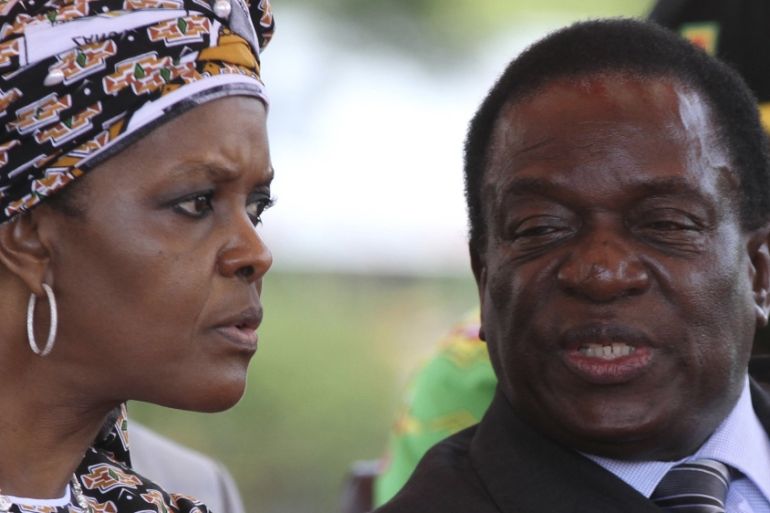Who are the key players in the Zimbabwe crisis?
Troops have taken over government buildings and state TV but have denied that a military coup is underway.

Robert Mugabe
Robert Mugabe was born on February 21, 1924, in what was then known as Rhodesia but is now called Zimbabwe.
The former school teacher, with seven university degrees, first came to prominence after waging a bloody guerrilla war against white colonial rulers, who jailed him for 10 years over a “subversive speech” he made in 1964.
Keep reading
list of 4 items‘Looting par excellence’: Mugabe family millions anger Zimbabwe
Opposition feels police heat ahead of voting in Zimbabwe
In Zimbabwe, reporter’s conviction sparks fears of renewed abuse
Soon after his release from jail in 1974, he caused a seismic shift in Rhodesian politics, riding a wave of popular outrage against the colonial establishment.
He fought in Rhodesia’s war for independence and became prime minister in 1980 of the newly independent country born from that conflict.
The new state was renamed Zimbabwe and Mugabe later assumed the presidency in 1987.
He married his current wife and Zimbabwe’s First Lady, Grace Mugabe, in 1996.
Since then, he has won a series of controversial elections marred by accusations of vote rigging, most significantly the 2008 vote, which he allegedly lost to now-Prime Minister Morgan Tsvangirai, sparking political violence that human rights groups say claimed over 200 lives.
While his supporters say he speaks for the poor; his critics say he has become increasingly authoritarian.
Mugabe’s rule has so far culminated in a massive economic crisis in Zimbabwe, once one of Africa’s richest countries.
Grace Mugabe
Born in 1965 in South Africa, Grace Mugabe has been the first lady of Zimbabwe since she married President Robert Mugabe in 1996.
She is 41 years younger than her husband and was known for her expensive shopping habits and charity work before taking an active role in the country’s ruling party, Zanu-PF, in which she leads the women’s division.
Her extravagant lifestyle has been a source of discomfort in Zimbabwe where many face severe economic hardship.
Grace Mugabe is said to be working to succeed Mugabe and her main rival to the presidency, Vice President Emmerson Mnangagwa was sacked by her husband in November 2017, leading to the military intervention.
She recently sued Zimbabwean newspaper, The Standard, after it published Wikileaks cables, which claimed she took huge kickbacks from diamond mines in Zimbabwe.
The University of Zimbabwe awarded her a doctoral degree in Sociology in 2014, two months after she started the course, sparking outrage among academics in the country.
Emmerson Mnangagwa
Emmerson Mnangagwa, the former vice president of Zimbabwe, was born in 1946 and went on to become one of the founders of Zanu-PF in the sixties.
He fought in the country’s war of independence and was arrested in 1965, subsequently spending the next ten years in prison.
After he was freed, he was deported to Zambia, where he studied and practiced law, in addition to serving as Zanu-PF’s secretary in Lusaka.
He became the special assistant to Mugabe in 1977, heading both the military and civil divisions of the party.
After independence, Mnangagwa became the first minister for national security and held various positions during his political career, ending up as vice president in 2013.
As a veteran of the war of independence and a powerful figure in Zanu-PF, he was seen as a possible successor to Mugabe.
Mnangagwa was removed from government by Mugabe in November 2017 for allegedly plotting against the incumbent leader and later fled to South Africa.
The vice president commanded the support of the army and veterans of the war of independence.
Zimbabwe Defence Forces
The Zimbabwe Defence Forces are made up of the Zimbabwe National Army (ZNA), the primary branch of the military, and the Air Force of Zimbabwe.
On November 15, the army took over the headquarters of the state broadcaster ZBC and blocked access to government offices, but denied a coup was underway.
ZNA was formed after independence in 1980, through the integration of the former Rhodesian army, Zimbabwe African National Liberation Army, Zimbabwe African People’s Union and the Zimbabwe People’s Revolutionary Army. The latter three fought the war of independence against the government in the seventies.
The army’s mission statement is “to defend the sovereignty, territorial integrity and national interests of Zimbabwe and to contribute to international peace and security”.
The Zimbabwean government claimed in 2007 that it foiled an alleged coup involving hundreds of soldiers and high-ranking officers.
Independence war veterans
Veterans of the war of independence are highly influential in the army and the ruling party.
Mugabe has regularly removed veterans from posts in Zanu-PF in recent years, replacing them with officials who did not fight in the war.
As a result, relations with the president the veterans soured and many vowed to form a front in opposition to Mugabe, backing Mnangagwa In the power struggle between the vice-president and Grace Mugabe within Zanu-PF.
Before November’s takeover, some army generals publicly said that they will not allow someone who did not fight in the independence war to rule the country after Mugabe, seemingly a reference to Grace Mugabe.
Right after the military intervention, Chris Mutsvangwa, the head of the war veterans’ group Zimbabwe National Liberation War Veterans Association (ZNLWVA), issued a statement, praising the army for “a bloodless correction of gross abuse of power”.
The statement said the army will return Zimbabwe to “genuine democracy”.